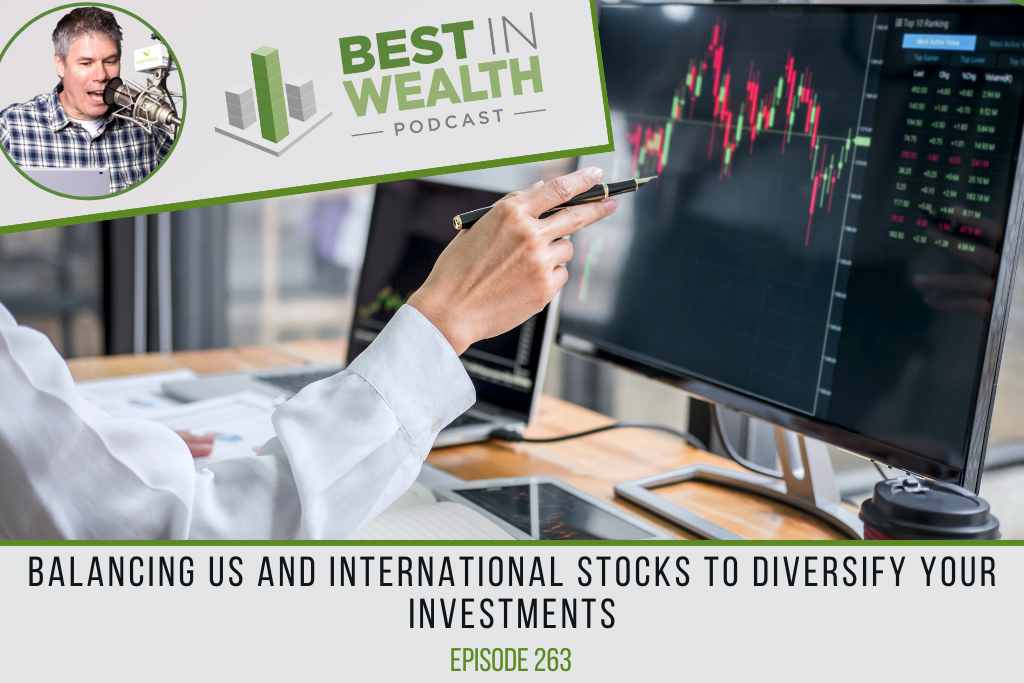Balancing US and International Stocks to Diversify Your Investments, Ep #263

Most investors have been ignoring international stocks lately because the US market has been performing so well—but that strategy might backfire this year, with international markets significantly outpacing American stocks.
In this episode, I dive into why diversifying globally is not just smart investing; it is essential for long-term wealth building. We explore how the US currently dominates 61% of world market capitalization, but history shows this was not always the case—and it will not necessarily continue.
I share four key reasons international investing should be part of your portfolio: it reduces geographic risk when any one country hits turbulence, gives you access to high-growth emerging markets that have delivered spectacular returns, protects you through currency diversification, and helps overcome the natural tendency to only invest in familiar companies.
The numbers tell a compelling story—while the S&P 500 is up around 12% this year, international developed markets are up nearly 30%, and some individual countries have delivered returns of 50-90% in recent years.
Whether you are completely US-focused or wondering how much international exposure makes sense for your situation, this episode provides the data and reasoning you need to build a more resilient, globally diversified portfolio. I also touch on an interesting parallel between portfolio diversification and gut health—turns out both benefit from variety and balance.
Outline of This Episode
- [01:12] The importance of the gut microbiome for health.
- [03:42] International markets surpass US performance right now.
- [06:24] International diversification mitigates geographic risk.
- [10:25] A globally diversified portfolio balances volatility and gives opportunity for growth.
- [13:49] Invest internationally to protect against domestic currency depreciation.
- [15:13] Why to overcome a behavioral home country bias.
- [17:06] Review your health and financial diversification.
Building a healthier, more resilient investment portfolio.
Broadening your approach—whether it is what you eat or where you invest—can improve your long-term outcomes. Did you know that we all have an ecosystem of microbes living within our intestines? Science increasingly shows that a highly diverse gut microbiome is linked to better health, well-being, and more healthy years well into old age. A thriving gut health requires at least 30 different types of plant-based foods each week. The greater the diversity, the more kinds of helpful bacteria can flourish, supporting everything from digestion to immunity.
Just as variety improves gut health, diversity is equally essential in investing. Many Americans have opted to remove international stocks from their portfolios, citing the recent dominance of U.S. markets. I want to push back on this trend, with these important points:
- The Shifting Sands of Market Dominance:
As of early 2024, U.S. markets make up approximately 61% of the world’s capitalization. The next-largest market, Japan, accounts for only 6%. While the U.S. is dominant now, this was not always the case. In the 1990s, Japan claimed over 40% of the world’s market cap, while the U.S. plunged to just 25%. History tells us that leadership rotates—sometimes rapidly.
- International Outperformance:
Many investors overlook periods where international markets outperformed the U.S. For example, in recent years, Hungary, Turkey, and the Czech Republic each posted eye-popping returns, outpacing the U.S. significantly.
Four Reasons You Need International Investments
If you are still not convinced, here are some really good reasons for including global assets in your portfolio:
1. Broader Diversification:
Global investing reduces the impact of a downturn in any single country—you will not suffer as heavily if one economy stumbles. It also balances your exposure through different economic and market cycles, smoothing out volatility and lowering overall risk.
2. Access to Unique Growth Opportunities:
Emerging markets and diverse sectors abroad can offer higher growth potential. Limiting yourself to U.S. stocks means missing out on global brands such as Toyota, Nestlé, and Samsung, as well as entire sectors less represented in America.
3. Currency Diversification:
International investments provide natural protection against swings in the U.S. dollar. If the dollar weakens, non-dollar holdings often become more valuable, helping to preserve your purchasing power and hedge against domestic inflation.
4. Overcoming Home-Country Bias:
Many investors naturally stick to what they know (sound familiar?). But with 40% of global investment opportunities outside the U.S., choosing not to invest abroad means intentionally missing out on nearly half the world’s growth potential.
Diversify Diet and Dollars
I want to encourage you to review your own portfolio for international exposure. Start by checking what percentage is allocated overseas and ask—does this reflect your long-term interests, or just recent trends? Talk with your financial advisor to find a balance that suits your family’s goals. And remember: whether it is your gut or your investments, variety really is the spice of (a healthy, resilient) life.
Connect With Scott Wellens
- Schedule a discovery call with Scott
- Send a message to Scott
- Visit Fortress Planning Group
- Connect with Scott on LinkedIn
- Follow Scott on Twitter
- Fortress Planning Group on Facebook
Podcast Disclaimer:
The Best In Wealth Podcast is hosted by Scott Wellens. Scott Wellens is the principal at Fortress Planning Group. Fortress Planning Group is a registered investment advisory firm regulated by the US Securities and Exchange Commission in accordance and compliance with securities laws and regulations. Fortress Planning Group does not render or offer to render personalized investment or tax advice through the Best In Wealth Podcast. The information provided is for informational purposes only and does not constitute financial, tax, investment or legal advice.
Audio Production and Show notes by
PODCAST FAST TRACK
https://www.podcastfasttrack.com



